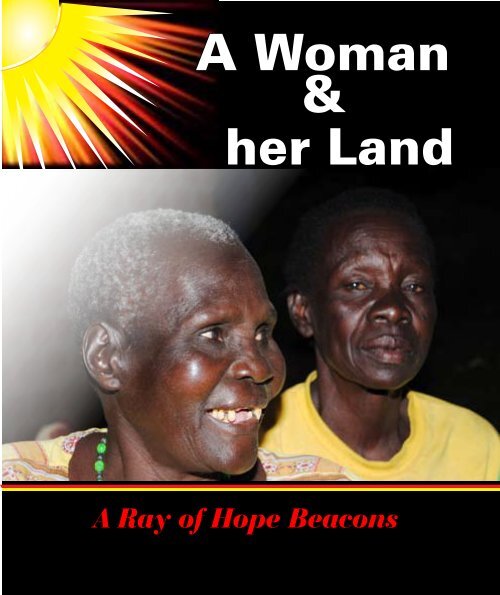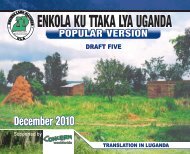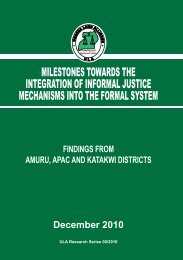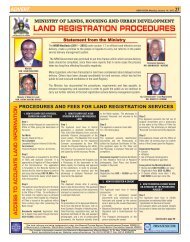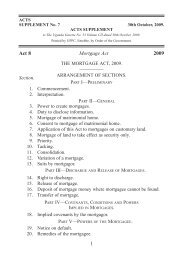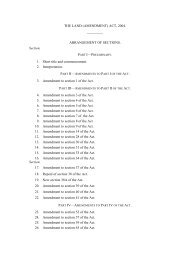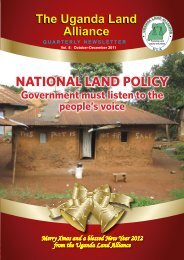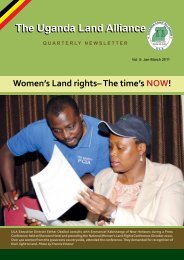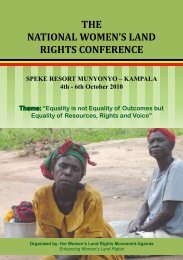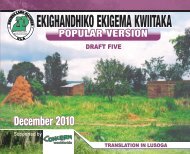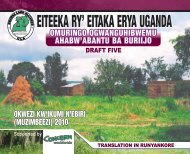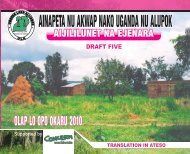A Woman & her Land - Uganda Land Alliance
A Woman & her Land - Uganda Land Alliance
A Woman & her Land - Uganda Land Alliance
- No tags were found...
You also want an ePaper? Increase the reach of your titles
YUMPU automatically turns print PDFs into web optimized ePapers that Google loves.
A <strong>Woman</strong>&<strong>her</strong> <strong>Land</strong>A Ray of Hope Beaconsi
A <strong>Woman</strong> and <strong>her</strong> <strong>Land</strong> -A ray of hope beaconsDocumentation Team:The following persons worked tirelessly to make this publication a reality:Tumusiime Kabwende Deo [Lead writer]Redemptor Nakuya [Note taker]Est<strong>her</strong> Akwii [Note taker]Francis Emorut [Still Photography]Stephen Mwiri [Video Documentary]Print and design: Ones Enterprises Ltd. 0772463521Generously funded by American Jewish World Serviceii
Copyright © 2011, <strong>Uganda</strong> <strong>Land</strong> <strong>Alliance</strong>The <strong>Uganda</strong> <strong>Land</strong> <strong>Alliance</strong> Secretariat,Plot 1521, Block 29, Mawanda RoadP.O Box 26990 Kampala, (U) Tel: +256- 414-540048,Fax: +256-414-540038, E-mail: ula@ulaug.org, Website: www.ulaug.orgiii
Table of conteNTS1. Appreciationiv2. Statement from the Ministry of <strong>Land</strong>s, Housing& Urban Development v3. Executive commentsvi4. Editor’s remarksvii5. Background to women’s <strong>Land</strong> Rights16. Women’s experiences on land - An overview27. Contextual Background38. Voice of Elders49. Case studies610. References28iv
AppreciationThe <strong>Uganda</strong> <strong>Land</strong> <strong>Alliance</strong> acknowledges the cooperation of keystakeholders that offered relevant materials that informed thisproject including; the various individuals who volunteered toshare their experiences, Dennis Obbo of the Ministry of <strong>Land</strong>s,traditional authorities and elders in the respective districts, localleaders, officers at ULA’s <strong>Land</strong> Rights Centres, the Legal AidProject of the <strong>Uganda</strong> Law Society particularly Angela Bahenzireand Zemei Susan, the Slum Women Initiative for Development(SWID) Director Joyce Nangobi, and the communities visited fortheir exceptional hospitality.We would like to thank in a special way the AmericanJewish World Service (AJWS) for the logistical supportto this project.v
Statement from the Ministry of <strong>Land</strong>s,Housing & Urban DevelopmentThe situation of women’s land rightsDennis Obbo<strong>Land</strong> is one of the mostimportant resourcesin <strong>Uganda</strong> w<strong>her</strong>e womenand men derive theirlivelihoods. The unequalaccess to and controlof land is a major formof economic inequalitybetween women and menand has consequences forwomen as actors in thedevelopment process.<strong>Uganda</strong> is a signatory to most International HumanRights and Women’s rights conventions includingthe Convention on the Elimination of all forms ofDiscrimination Against Women (CEDAW) and hasstrived to domesticate it in all the relevant sectors,including the <strong>Land</strong> Sector.Government position has zeroed down to addresswomen’s concerns. Articles 32, 33, 34, 35, objectiveXI of <strong>Uganda</strong>’s Constitution put great emphasis onthe need to address women related gender issues.A National Gender Policy is in place to guide t<strong>her</strong>edress of gender imbalances in society and itsoverall goal is to ensure that gender concerns areincorporated into the national development processin order to improve the social, political, economiclives of people in <strong>Uganda</strong> particularly women.The <strong>Land</strong> Act (CAP 227) addressesgender issues related to:• Composition of land administrationinstitutions;• Transactions on Family land; and• Registration of landWomen constitute 51% of the population andprovide 70-80% of all agricultural labor and 90%of all labour involving food production, yet theyown an estimated 20% of registered land. Themajority of women are dependent on men to accessland. Women, who are childless, single, widowed,disabled, divorced, or with only female childrenoften have little or no access to or ownership ofland.<strong>Land</strong> ownership rights t<strong>her</strong>efore pose the mostchallenging frontier that Government seeks totackle in its quest for gender equality and equity.The Draft National <strong>Land</strong> Policy once approved,will have serious positive implications on the landrights of various categories of women as it seeks topromote gender integration at all levels of planning,implementation, monitoring & evaluation. It alsoseeks to provide for legislation and law reviewsto ensure women’s effective participation andcontribution to the <strong>Land</strong> sector and <strong>Uganda</strong>’sdevelopment at large.Dennis ObboMinistry of <strong>Land</strong>s, Housing & Urban Developmentvi
Executive commentEst<strong>her</strong> ObaikolExecutive Director<strong>Uganda</strong> <strong>Land</strong> <strong>Alliance</strong>It’s nearly fifteen yearstoday since the worldconference on womenin Beijing China, the keyquestion regarding theuniversality of humanrights remains largelyunanswered, particularlywhen it comes to women’sland rights.Control and power over land in <strong>Uganda</strong> today isconferred by interest of the holder who may transfer,pass on by will or through commercial transactionsand in most cases is dominated by the men. Yet thepower of women to acquire land through purchase,which is the surest available alternative, is limiteddue to their weaker economic status. To make mattersworse, even those to whom land has been transferredby their parents or spouses, it’s sooner than latergrabbed from them by relatives using all sorts oftricks.The <strong>Uganda</strong> <strong>Land</strong> <strong>Alliance</strong> and the Women’s <strong>Land</strong>Rights Movement in particular, believe that poorand rural women will only achieve hig<strong>her</strong> levels ofeconomic independence and more secure livelihoodsif their rights to land are assured; and that denial ofwomen’s rights to property and land in particularreinforces their economic dependence on men,t<strong>her</strong>eby impeding their ability to effectively achievetheir own, and contribute to their families’ betterlivelihoods.It is t<strong>her</strong>efore important for all stakeholders to put inplace deliberate laws and policies that will practicallyensure the promotion of women’s acquisition, controland utilization of land. It’s not just enough to mentionthese rights in coloured books of law because majorityof especially the rural women cannot afford the heftycosts of court representation to defend their landrights.To us, the struggle for Women’s land rights in <strong>Uganda</strong>is more than mere equality as conveyed in the statutebooks; it is the translation of this equality into practice.It entails determining the minimum standards orlevels of resource access, ownership and control byboth men and women; the cultural biases embeddedin notions of choice, agency and autonomy, most ofit revolving around the concepts of patriarchy; thetypes of public policy needed to address and correctgender injustices, and the locus of responsibility foraddressing these injustices, taking into account boththe formal and informal structures. Women’s right toland is indeed a struggle for equal citizenship.I wish at this point, to applaud the efforts of all ourpartners, who have supported us in the struggle torealize the sizeable achievements so far registeredtowards successfully assisting the most vulnerablewomen as evidenced in this publication. Oh how wewould have loved to be t<strong>her</strong>e for all the hundreds ofaffected women out t<strong>her</strong>e!We call upon Government to put in place functionalstructures that will reduce emergence of similar casesespecially during this age and time when the scramblefor land has hit its highest in the recent years. ULAwill continue to offer services to the women of thiscountry within the available resources, with a hopethat some day, all men, women and children in thiscountry, shall live harmoniously toget<strong>her</strong> in a fairand just society.Est<strong>her</strong> Obaikol,Executive Director, <strong>Uganda</strong> <strong>Land</strong> <strong>Alliance</strong> &Coordinator; Women’s <strong>Land</strong> Rights Movement-<strong>Uganda</strong>vii
Editor’s RemarksTumusiime K. Deo, EditorTheGovernmentof <strong>Uganda</strong> haspledged accordingto the National<strong>Land</strong> Policy, tolegislatively ensurethat both womenand men enjoyequal rights toland.Indeed some cultural traditions for example inAcholi have also come up with guidelines to ensurethat this principle is realized. However, t<strong>her</strong>e’sneed to establish tangible implementation andenforcement structures to ensure that these rosypromises are translated into action at householdlevel. NGOs have performed quite handsomely asevidenced in the cases profiled in this publication,but the mantle of work needed to transform societalnorms is quite enormous.It is very evident that tenure transformation in<strong>Uganda</strong> has moved at a whirlwind speed. Unlikedays of old, land today is considered a commodity,selling like hot cake. While the passing of theNational <strong>Land</strong> Policy drags on, a number of womenhave continued to lose their land, and this situationwill not cease until everyone rises up to say a bigNO to the infringement of women’s land rights.T<strong>her</strong>e are also conflicting legal provisions, forexample the law on compulsory acquisition of landfor development, whose implementation has hadcrude implications on previous land owners such asthe late Est<strong>her</strong> Aciro, the blind woman from Amuruwhose entire 60 acres of land was grabbed by AmuruTown Council. Such provisions must be refinedin such a way that the land owner is adequatelycompensated before they vacate the landOn the ot<strong>her</strong> hand, everyw<strong>her</strong>e we visited duringthe documentation process, we were welcomedby very miserable old women, some of whom, atthe age of 70+, have never owned a piece of land.Why must our grandmot<strong>her</strong>s suffer so cruelly likethis? As if having no land is not enough, t<strong>her</strong>e’s noslightest arrangement in any community we visited,aimed at ensuring the livelihood of the elderly-yetit’s on their tireless contribution that <strong>Uganda</strong> bears<strong>her</strong> foundation.T<strong>her</strong>e’s t<strong>her</strong>efore need for absolute good willand commitment from all key players in order toguarantee a brighter future for this and the nextgenerations to come.Tumusiime Kabwende DeoEditor,E-mail: tumusiimedeo@hotmail.com, tdeo@ulaug.orgviii
Background to Women’s <strong>Land</strong> RightsAccording toArticle 2 ofthe 1948 UniversalDeclaration of HumanRights (UDHR) towhich <strong>Uganda</strong> is asignatory, “Everyone isentitled to all the rightsand freedoms set forthin this Declaration,without distinction ofany kind, such as race,colour, sex, language,religion, political orot<strong>her</strong> opinion, nationalor social origin, property, birth or ot<strong>her</strong> status...”.This is consistent with Article 1 which statesthat “All human beings are born free and equalin dignity and rights. They are endowed withreason and conscience and should act towards oneanot<strong>her</strong> in a spirit of brot<strong>her</strong>hood”; and Article 17(1 and 2) “ Everyone has the right to own propertyalone as well as in association with ot<strong>her</strong>s; and Noone shall be arbitrarily deprived of his property.”<strong>Uganda</strong>’s 1995 Constitution is in tandem with theUDHR and ot<strong>her</strong> regional and international humanrights instruments. Article 33(6) of the Constitutionfor example prohibits ‘laws, customs or traditionswhich are against the dignity, welfare or interestof women”. Considering that all human rights arein<strong>her</strong>ent, and that they apply to everyone by virtueof their status as human beings irrespective ofsexual orientation, discrimination of women on landrights is t<strong>her</strong>efore untenable because it impedes theconcept of fairness and mutual co-existence.Despite the promulgation of basic human rights inthe Constitution, most traditions across the country,for many years have continued to suppress women’srights particularly to land and ot<strong>her</strong> property, whichhas kept them trapped in a vicious cycle of poverty.According to the International <strong>Land</strong> Coalition (ILC),“Women have fewer benefits and protection underlegal systems than men and are largely excludedfrom decision-making structures. Women also lackcontrol of financial resources, have larger workburdens, and are more likely to suffer from socialisolation and threats or acts of violence.” This isdespite the fact that;“Women are primary agriculturalproducers, cultivating between 60and 80 per cent of the food in mostdeveloping countries, and ensurehousehold food security.”Continued to page 21
Women’s experiences on land-An overviewThis project is informed by <strong>Uganda</strong> <strong>Land</strong><strong>Alliance</strong>’ field programmes in variousdistricts, in which it has been observed thatwomen continue to face challenges overland ownership. In fact, a 2009 sample studyconducted by ULA <strong>Land</strong> Rights Centres in thedistricts of Amuru, Apac, Moroto, Katakwi andPader, indicated that only 22% of over 131 casesreported were resolved. This situation is saidto be occasioned by general lack of knowledgeon rights and references of less costly redressmechanisms offered by various institutions bothformal and informal.ULA, in coordination with <strong>her</strong> field offices and ot<strong>her</strong>partners on the ground, identified individuals from8 districts whose stories were said to be successfulexamples. The districts in question are; Amuru,Apac, Gulu, Pader, Hoima, Kyenjojo, Mubende andJinja.Between May and July 2011, a DocumentationTeam embarked on field trips to the districts andvisited the identified persons in their homes to listento and document their stories first hand. The teamalso endeavored to speak to the respondents, thoughin some instances it was not possible as they wereeit<strong>her</strong> unavailable or were said to be unwelcoming.However, in all cases, an effort was made to capturethe perspective of members of the communityincluding traditional leaders, elders, local leaders,parents, spouses and children of the victims, andNGO representatives who handled some of thecases. These helped to collate the stories. Specificemphasis was put on reference to key documentationincluding wills of the deceased (w<strong>her</strong>e applicable)and case judgments and agreements.The overall purpose of this project is increase thevisibility of women’s capacity to demand for thefulfillment of their land rights. This will go a longway in enhancing their quality of life through tenuresecurity as they will be able to utilize their landwithout hindrance.Continued from page 1H. E. Y. K. Museveni<strong>Uganda</strong> PresidentYoweri KagutaMuseveni whilelaunching theWomen’s <strong>Land</strong>Rights Movementin October 2010at Speke ResortMunyonyo statedthat, “Not onlyis the Africanwoman the childbearer; she cooks, farms, grinds grain, fetcheswater and collects firewood, teaches <strong>her</strong> children,nurses the sick, provides quality companionshipto the husband, e.t.c. It is only in a few Africansocieties w<strong>her</strong>e this formula of burden sharing isreversed, with men doing more work than women.He goes on to re-emphasize that “Indeed, Equalityis not Equality of Outcomes but Equality ofresources, Rights and Voice. According to WorldFood Programme reports, women in Africacontribute 70 per cent of food production andnearly half of all farm labour.”2
Contextual Background from the fieldclaims to land in customary arrangements are muchstronger than suggested by many studies becauseof their embedment in social relations…”Sadly to date in many cultures, land in<strong>her</strong>itanceremains a preserve of the boy child, while the womenare only allowed user rights. To make mattersworse, even the few women that are chanced toin<strong>her</strong>it land from eit<strong>her</strong> their parents or husbands,later have it grabbed from them by close relativesor in some instances by outsiders-just because theyare women!T<strong>her</strong>e are four land tenure systems in <strong>Uganda</strong>namely; Mailo, Freehold, Leasehold andCustomary.However, considering women’s torrid backgroundw<strong>her</strong>e they are just emerging from the “kitchen’,the surest tenure for women to acquire land hasbeen the Customary, and most specifically throughin<strong>her</strong>itance. This is confirmed by the Africa StudiesQuarterly, which states that “Many scholars havefound elsew<strong>her</strong>e in Africa that, in reality, women’sMajority of the rural women are very poor and haveno capacity for legal representation, which putsthem at a huge disadvantage when faced with landrelated court cases. However, t<strong>her</strong>e is a glimmerof hope as some few scattered women across thecountry have successfully been assisted to fightfor their land rights eit<strong>her</strong> through formal courtsystems or out of court settlements. The <strong>Uganda</strong><strong>Land</strong> <strong>Alliance</strong> visited the districts of Amuru, Apac,Gulu, Pader, Hoima, Kyenjojo, Mubende and Jinjato capture the voices of those successful women,whose cases should serve as an example to ot<strong>her</strong>sfacing similar challenges.3
Voice of the EldersIn order to understand the emerging concept of women’sownership of land, the <strong>Uganda</strong> <strong>Land</strong> <strong>Alliance</strong> spoke witha number of elders from different communities to get apicture of what the situation was like in their time andwhat they say the situation ought to be like.Fact 1:In olden days, land was vast; owned byentire clan or families, and everyone lived happilyin harmony. T<strong>her</strong>e was no need to apportion landto individuals since land belonged to everyone. Assuch, conflicts over land were very minimal or nonexistent.Fact 2:Across various cultures and regions, itwas also generally observed, that boy childrenwere the heirs to their fat<strong>her</strong>s’ property (includingland). The girls had no right to in<strong>her</strong>it their fat<strong>her</strong>’sland because at marriage, they were considered tobelong to the family of their husband. It’s t<strong>her</strong>e,that they were expected to make any claims; but inreality, women never even owned land from theirhusbands but were only allowed user rights. In onecase in Jinja, Rukia was almost chased from the landand property <strong>her</strong> late husband purchased ‘toget<strong>her</strong>’with <strong>her</strong>!Fact 3:Once a woman got married, she was notexpected to divorce for any reason.If a woman got divorced andreturned home, <strong>her</strong> children wererejected on accord of belonging to<strong>her</strong> husband’s clan.In fact to date in many cultures, children ofsuch women cannot be buried at their maternalgrandfat<strong>her</strong>’s home.According to Joana Matama(65), “Long time, boychildren used to in<strong>her</strong>ittheir fat<strong>her</strong>’s property onthe understanding that theywould stay on the land andprotect their sisters andmot<strong>her</strong>. They were expectedto marry on the land so as toincrease their clan. They used to be very obedient andrespectful.However today, boys are irresponsible and many ofthem are so much money-minded. They sell the landand waste away the proceeds in bars and ot<strong>her</strong> luxuries”.Joana says it’s for this reason that fat<strong>her</strong>s ought to givetheir girl children a share of the family property so thatthey too can fend for their own life.4
Amelia Kabayaga (65)from Butiiti Kyenjojo saysthat, “When a woman gotmarried, t<strong>her</strong>e was no chancefor divorce. “You would bebeaten and you sleep in thebush, but the next day returnback home and reconcile with your husband. Today,after a small quarrel, women divorce and returnback home.” Women were said to be very tolerantof violations against their rights, something that thewomen’s movement has vehemently rejected in thecontemporary world because it is an abuse of women’shuman rights. As such, society has got to adjust to suitthe change of times because when the women return totheir fat<strong>her</strong>s’ homes, they need land to survive and toraise their children.The change of times has seen the introduction ofindividual ownership of land, a notion that has sidelinedmany poor people, who are unfortunate not to havein<strong>her</strong>ited land from their parents. This development hasmostly affected women considering that traditionallythey have no ownership rights, yet they continue tocarry the burden not only of raising children but alsoproviding food for the family, including their husbands.Also considering that women remain the least well paidcompared to their male counterparts including thosedoing similar jobs, their capacity to purchase land ontheir own remains significantly low.“People in olden days lived a nomadic kindof life, moving from place to place dependingon the productivity of the land they occupied.T<strong>her</strong>e were less conflicts over land. Themovement also allowed the land ample timeto fallow in preparation for the next plantingseason.”Charles Ayo-Otula (72) the Clan Chief from Arak-Ongoda in Apac district,During our visit toKilak County, Paderdistrict, over 12 womenparticipated in a meetingwe held with the elders.Save for the fact thattraditionally women donot sit in such meetings,their presence was an indication of a renewedspirit. The women made their voices loud and clearbefore the men, and at the end of the day, manymen appeared to be convinced that women indeeddeserved their rights to land.This conviction was compounded by 70-year oldManasseh Acol Pule from Apac who emphasizedthat “<strong>Land</strong> belongs to all the people of <strong>Uganda</strong>;women, children, the disabled and everybody.”5
PaderDistrictCASE STUDIESAya’s Resilience saved<strong>her</strong> land6
Betrayed by a friend she loved so much, AyaSanta (56), a widow with six children to carefor, did not sit back and look on as <strong>her</strong> land wasunfairly grabbed.She pursued the case, and through the LC IIcourt, had the judgment in <strong>her</strong> way and broke thestereotype in Acholi culture of women not beingallowed to own land; and even when <strong>her</strong> friendcumtormentor attempted to violate the terms ofthe ruling, Aya sought the intervention of the ULA<strong>Land</strong> Rights Desk Office-Pader and the case wasresolved. She did not only win back <strong>her</strong> land, butalso was re-united with <strong>her</strong> old friend Okumu.It is a common practice in Acholi culture for peopleto permit their close friends to use part of theirland for cultivation. This was the case in the 70sfor Santa when approached by <strong>her</strong> long time friendOkumu Demu. According to their bilateral verbalCase Studiesleft with no option but to seek legal redress andmediation through the LCs and later ULA, and shewon <strong>her</strong> piece of land back.When the ULA team visited the reconciled Aya andOkumu in Ogom Sub-County, t<strong>her</strong>e was evidentjoy on the faces of the two friends-cum foes-cumfriendsas Aya Santa narrated <strong>her</strong> experience. In<strong>her</strong> final words as we departed from <strong>her</strong> home,Aya said, “I thank the LCs and the <strong>Uganda</strong> <strong>Land</strong><strong>Alliance</strong> for saving my land…”Observations:On a positive note, we witnessed the involvement ofthe community in defending Aya. As we interviewed<strong>her</strong>, leaders including the LCIII, LCII, Parish Chief,neighbors, children and friends all gat<strong>her</strong>ed manyof them uninvited-and they qualified Aya’s case.agreement, Okumu was to use the land for a periodof one year after which he was required to hand itback to Aya.Three (3) years later, Santa was still waiting to have<strong>her</strong> land back when she and ot<strong>her</strong>s were forcedinto the IDP camp following the Lord’s ResistanceArmy insurgency. At the same time, Okumu joinedthe army. Recently when Okumu resigned fromthe army and returned to the village, he settled onthe land formerly allowed him to use by Santa, butthen the land owner also badly needed <strong>her</strong> landtoo as the insurgency had ended and camps werebeing disbanded. When Okumu resisted, Aya wasSanta Aya with <strong>her</strong> son Micheal Oloya7
Case StudiesMargaret Adong talking about land mattersAcholi women jubilating after a land meeting at KilakSub-County in Pader districtKiberina Ayo shares a joke with the Editor8
Case StudiesApacDistrictMolly Etap reconcileswith Alado RufinoIn his own words, Mr. Rufino (right) concluded, “The only word I can sayis; thank you to <strong>Uganda</strong> <strong>Land</strong> <strong>Alliance</strong> and the traditional leaders because theyresolved the longstanding conflict between me and Molly”9
Case StudiesAs Molly Etap (55) led us to Rufino Alado’s(83) home, and with <strong>her</strong> arm outstretched,she pointed to the vast piece of land given to <strong>her</strong>by <strong>her</strong> late fat<strong>her</strong> way back in 1981. At Alado’shome, we were welcomed by the deafening noisefrom the barking dogs, but sooner than later, theentire compound was filled with an aura of joy aswe quickly settled in. Molly then walked straight toMzee Alado, who was having his lunch, and tightlyembraced him as a mark of their renewed friendship.The two live on opposite hills in Chawente SubCounty, Apac District.In 1981, when Molly’s marriage soured up, s<strong>her</strong>eturned to <strong>her</strong> fat<strong>her</strong>’s home. She decided never toget married again [to date]. Her fat<strong>her</strong> gave <strong>her</strong> apiece of land to start a new life, but little did sheknow that several years later she would be involvedin a protracted struggle to retain the same. At 55,Molly did not have any biological child says shetakes care of “uncountable” children and <strong>her</strong> elderlymot<strong>her</strong> (no record of age). During the interview, wewere surrounded by at least 10 children, all belowthe age of 12.Trouble started in 2004 when one Alado Rufino“started claiming my land. I reported to theLC I and won the case, but he appealed to LC III again won the case at LC II but he appealed toLC III and I still won”.Alado was not about to give up. He proceededto the Magistrate’s Court of Apac and Molly wassummoned. However, after 6 years of struggle in theformal courts punctuated by repeated adjournments,and after both parties spending so much in termsof money and time, Mr. Rufino requested that heand Molly seek an alternative form of resolvingtheir long standing conflict. Molly accepted thesuggestion and the two presented their case beforethe <strong>Uganda</strong> <strong>Land</strong> <strong>Alliance</strong> in conjunction with theLango Traditional Leaders Association that calledfor a meeting with the parties.At the meeting, “We started with prayers, and theelders read for us a verse from the Bible. They thenasked us to go out and negotiate. Rufino requesteda share of the land. I said I would only give himon condition that he admits the land doesn’t belongto him.” According to Molly, Rufino admitted andthe two returned to the meeting with a wide smileand broke the news. The entire mediation processis said to have lasted about 2 weeks. According toMolly, Mr. Rufino who owns anot<strong>her</strong> piece of landelsew<strong>her</strong>e was tempted to snatch Molly’s land afterthe death of <strong>her</strong> two brot<strong>her</strong>s.“After I won Rufino, it came to my mind thatit would be very bad to remain enemies with himsince we stay in the same village. I consulted myfamily and decided to give him a piece of land.We have been living peacefully since then”.Mr. Rufino told us that;“The conflict was resolved and now we areliving toget<strong>her</strong> with no problem.”Rufino walked to his house, picked out a file andshowed us copies of documents verifying that thecase had been settled. One of the letters, Reference,CL/D/2010 dated 10th/March 2010, indicated that21 people had participated in inspecting the landbefore the case was rested.10
Molly Etap shows <strong>her</strong> piece of land at Chawente Sub-County, Apac district. (and with <strong>her</strong> armoutstretched, she pointed to the vast piece of land given to <strong>her</strong> by <strong>her</strong> late fat<strong>her</strong> way back in 1981)Molly Etap poses for a group photograph with <strong>her</strong> family after the interviewat <strong>her</strong> home in Chawente Sub-County, Apac districtMolly Etap digging in <strong>her</strong> garden at Chawente Sub-County,Apac district11Case Studies
Case StudiesAMURUDistrictThe blind woman battled for <strong>her</strong>land to the point of deathEst<strong>her</strong> Aciro’s graveEst<strong>her</strong> Aciro’s grave beside <strong>her</strong> homesteadThe lateEst<strong>her</strong> Acirowhose landwas grabbedto buildAmuru districtheadquartersThis wasEst<strong>her</strong> Aciro’schair. Everymember ofthefamily hada chair withtheir nameinscribedon it12
Est<strong>her</strong> Aciro may not have lived to enjoy thefirst installment of <strong>her</strong> compensation as it wasonly sent to <strong>her</strong> account 8 days before <strong>her</strong> death;but w<strong>her</strong>ever <strong>her</strong> soul is [t<strong>her</strong>e in heaven], she mustbe resting in peace having won a high profile caseagainst the Amuru Town Council. The blind womanwas a proud land owner with over 60 acres to <strong>her</strong>name; but when Amuru was declared a district,all <strong>her</strong> land was grabbed and a pea-nut monetarybargain forced into <strong>her</strong> hands, before sympathizerscame to <strong>her</strong> rescue. Est<strong>her</strong> (70) succumbed todeath just as <strong>her</strong> case had reached its climax andwas buried in the very land she fought so hard todefend.As we entered Est<strong>her</strong>’s compound in Ower Ward,Amoyokoma Sub-Parish; our first sight was <strong>her</strong>grave right in the compound near the entrance to thehut w<strong>her</strong>e she once lived happily with <strong>her</strong> family.Est<strong>her</strong>’s 4th born son Bosco Oluba, still in shockover his mum’s death welcomed us, but sadnesswas written all over his face. He picked a number ofsmall chairs for us from the family hut, so small thatyou’d think they were for little children. However,interestingly, they were strong enough even fora huge and heavy person. Each of the chairs wasbranded with a family member’s name. Amongthem was Est<strong>her</strong>’s chair with <strong>her</strong> name clearlymarked in blue- but the owner was no more.An old adage says that “one man’s meat is anot<strong>her</strong>man’s poison”- this was the reality in Est<strong>her</strong>’s lifewhen the elevation of Amuru County to districtstatus meant that the old woman’s land had tobe grabbed from <strong>her</strong>. According to Donato Oola-Olam, the Assistant Chief Administrative Officer(ACAO) who at the time was the Town Clerk andt<strong>her</strong>efore at the heart of the entire process: “GivenCase Studiesour mandate of ensuring effective planning for thedistrict, we decided to acquire land from owners andto allocate it to developers.” Apparently, this wasdone under the cover of a constitutional provisionon compulsory acquisition of land.Bosco Oluba and his brot<strong>her</strong> Joe Odong during the interview at theirhome in Amuru district headquarters.Bosco (40) explained to us that the Town Councilauthorities connived with Kinyera Simon aclan brot<strong>her</strong> and engaged in dirty rushed-upnegotiations. At one point, we were told, Est<strong>her</strong> wasgiven an ultimatum eit<strong>her</strong> to sign the agreement orlose <strong>her</strong> land altoget<strong>her</strong>!Thanks to the intervention of one resident OpenyEdward, who was also LC III Chairman at thetime, Est<strong>her</strong> was aided to lodge a case in court. TheTown Council had arbitrarily decided on a priceof 2Million per acre, a move that the Judge foundwanting before ordering a proper valuation of theland. The two conflicting parties were urged to13
Case Studiesall without Est<strong>her</strong>’s consent.Our documentation team reviewed a series ofdocuments related to the case that included a letterfrom the Surveyors’ Registration Board that readin part, “I have searched the register of registeredsurveyors and found that the above named personis not and has not been a registered surveyor underthe requirements of Cap 275,” signed, C. I Inyangat,Bosco Oluba poses for a group photo with his family at their home inAmuru districtengage professional valuers, but interestingly, thegovernment valuer came up with the same figureof 2M per acre as had initially been offered by theTown Council, opposed to the 4M figure of Est<strong>her</strong>’svaluer. According to Mr. Openy [statementscorroborated by both Bosco and Donato], theinitial price of 2M per acre had been assented to bythe Registrar’s Secretary. This was in response tothe fraudulent undervaluation of Est<strong>her</strong>’s land byone Denis Omodo Ogwang who was acting onbehalf of the Town Council.After the successful court battle, the conflictingparties were urged to engage in an out of courtsettlement in which it was agreed that the Councilpays Est<strong>her</strong> 4M per acre less of 10 acres, the landw<strong>her</strong>e <strong>her</strong> homestead was located.Painfully still, Donato said to us:“If your land has beenplanned for example to be acivic area, it has to be so. Acirohas to leave at some point.”He added,Donato Oola-Olam, Assistant Chief Administrative Officer, AmuruKinyera and ot<strong>her</strong>s, and indeed a down payment of20 Million Shillings was made by the Town Council;8M paid to Kinyera and 12M on behalf of the familyto Odur Cijar anot<strong>her</strong> relative involved in the deal-“We delayed some processes,but the plain fact is that thearea has been planned and itwill be implemented as perthat plan .”At the end of the day, Est<strong>her</strong> was a victor to a certainextent, but the exchange of <strong>her</strong> property [land] withtinted paper, meant that <strong>her</strong> family will never be thesame again.14
Case StudiesGULUDistrictLease of Life for Orama15
somber mood still hang aroundA Pauline Orama’sface when the <strong>Uganda</strong><strong>Land</strong> <strong>Alliance</strong>Documentation teamvisited <strong>her</strong> homein Kweyo village,Ongako Sub-County, Gulu; butas she narrated <strong>her</strong>painful ordeal, thestar of the winner in<strong>her</strong> was very evident. In<strong>her</strong> words mentioned to usthrough a translator, Paulinesaid, “At least I am now happyand somehow settled because FIDA helped me”.Pauline Orama (46), a mot<strong>her</strong> of 8 childrensuccumbed to the practice of widow in<strong>her</strong>itancefollowing the passing on of his first husband OboteGodfrey. She explained to us that in their culture,“The issue of a man owning his land does notexist,” but if he dies, the wife continues using theland w<strong>her</strong>e she used to dig. The confidence withwhich she hinted on this showed no signs of landownership hinged on a thin thread because asindeed many cultural leaders explained; land inyester-days was never a problem!Throughout the interview, Pauline appeared to havedisturbed memory of critical events that happenedin <strong>her</strong> life, but it appears that she was later advisedby <strong>her</strong> mot<strong>her</strong> in-law to get married to <strong>her</strong> brot<strong>her</strong>in-law for the sake of raising the children. Sheconsequently was in<strong>her</strong>ited by Opira Samuel, whosadly also died not long after delivering with him,anot<strong>her</strong> set of 4 children.Pauline Orama poses for a group photo at <strong>her</strong> home inKweyo Sub County, Gulu districtCase StudiesBy now she hadtransferred from <strong>her</strong>first husband’s landto Opira’s, w<strong>her</strong>eshe continued tostay until anot<strong>her</strong>brot<strong>her</strong> in-lawattempted tochase <strong>her</strong> away.Pauline was notabout to becomedestitute. She raisedthe matter to the LCswho ruled in <strong>her</strong> favor,but the judgment wasnot honoured by the respondent, Peter Onek. Wespoke with the LC I Chairman Olango Bosco and heconfirmed participation in this case at some point.He said, “… since then she has not come back tocomplain.”The matter was only settled after a friend advisedPauline to seek redress from FIDA-<strong>Uganda</strong>-Guluoffice. FIDA <strong>Uganda</strong> is a long serving member ofthe <strong>Uganda</strong> <strong>Land</strong> <strong>Alliance</strong>. A date was set for theinspection of the land in question and a meetingwas called, attended by clan leaders, LCs and theconflicting parties. It was later agreed that Paulineretains part of the land w<strong>her</strong>e she resided and aportion of the land under conflict was to be given toPeter Onek, in the interest of keeping peace.Pauline now says that since the mediation meeting,she has not had any ot<strong>her</strong> problems over <strong>her</strong> land.She has now planted some Maize, G. Nuts, Cassava,and wants to also plant some Cabbages soon.16
Case StudiesHOIMADistrictDespite the will,Ganyana almost lost it all17
Case Studiesfat<strong>her</strong> and says, “It’s me who treated him-he diedin my hands”.As if to reward Ganyana for <strong>her</strong> care, and being ablood daughter anyway, Yowasi chose to bequeathhis house and land to Ganyana. However, after hispassing on, this state of affairs did not go well withGanyana’s step brot<strong>her</strong>s and step mot<strong>her</strong>. Theythreatened <strong>her</strong> and demanded that she returnsto <strong>her</strong> ex-husband. According to the traditionalculture in Bunyoro and indeed many ot<strong>her</strong> parts of<strong>Uganda</strong>, only boy children can in<strong>her</strong>it their fat<strong>her</strong>’sland as girls are said to belong to the family they getmarried to.Legal Officer of Legal Aid Project of <strong>Uganda</strong> Law Society, SusanZemei during an interview in Masindi TownShe had been technically defeated in courtdespite possessing the will in which <strong>her</strong> fat<strong>her</strong>bequeathed property to <strong>her</strong>, but thanks to the LegalAid Project, the hand of gold reached out just intime. The story of Florence Ganyana tells of how <strong>her</strong>step brot<strong>her</strong>s disobeyed their deceased fat<strong>her</strong>’s will,argued their way in court and summarily evicted<strong>her</strong> out of <strong>her</strong> fat<strong>her</strong>’s house. She stayed out in thecold for close to a month until a Good Samaritanoffered to help <strong>her</strong> challenge the unfairness metedagainst <strong>her</strong>.All was well with Florence Ganyana (56), a mot<strong>her</strong>of 3 till one day when she divorced from <strong>her</strong>husband and decided to return home to attendto <strong>her</strong> sick fat<strong>her</strong>. The fat<strong>her</strong>, Bagada Yowasi hadrecently separated with his official wife BulandinaNzeireki, and needed someone to help him out. Hisdaughter’s return home upon divorce, was t<strong>her</strong>eforea blessing in disguise. Ms. Ganyana nursed <strong>her</strong>Ganyana quickly rushed to Magistrate Grade II forredress. She can be forgiven for not knowing that in<strong>Uganda</strong>, this court does not hear land cases, but forthe Magistrate not to have advised <strong>her</strong> accordingly,and even going ahead to make judgment in <strong>her</strong>favor, was a terrible legal mistake. Ganyana’s stepbrot<strong>her</strong>s who were relatively well off immediatelyenlisted the intervention of a lawyer only identifiedas Baryabanza, who filed a case at the ChiefMagistrate’s court, challenging the judgment of theMagistrate Grade II. Their appeal (Civil Appeal No.HMA-OO-CV-C5 of 2009) reiterated that the latter,had no powers to entertain a land case; they prayedthat “It is proposed to ask the Honourable Courtfor orders that the whole decision of the learnedGrade II Magistrate be set aside and costs t<strong>her</strong>eforebe provided. As the court granted the order prayedfor, Ganyana had the uphill task to represent <strong>her</strong>self,which she did in vain.Ganyana subsequently lost the case and in his1818
Case StudiesMwebaze and Co. Advocates, Ganyana rushedto Legal Aid Project as a last resort intervention.They appealed to the Deputy High CourtRegistrar Margaret Muntonyi, who immediatelyoverturned the vacation order in <strong>her</strong> ruling anddirected the District Police Commander Hoimato “Put back Ganyana Florence in the house,pending determination of their appeal.The case later took a significant twist when LAPFlorence Ganyana and <strong>her</strong> mot<strong>her</strong> Cecilia Basala during the interviewat <strong>her</strong> home in Hoima districtjudgment [Dated and stamped February 2nd 2010], theChief Magistrate A.G Opifemi equally erred by makingextra orders that Ganyana vacates the premises. T<strong>her</strong>uling read in part, “The Magistrate Grade II doesnot have powers to resolve land disputes even underthe guise of resolving family matters. By doing soin this case, he exceeded his powers by trying a casefor which he did not have legal authority…For thismatter…it is ordered that the respondents pay the costsof the appeal…It is also ordered that the respondentsvacate the premises… until a competent court ordersot<strong>her</strong>wise.” It is at this point that the Chief Magistrate’scompetence had to come under scrutiny.Having won the case, Ganyana’s step brot<strong>her</strong>s quicklysecured police and court brokers and had the oldwoman’s property thrown out. Her house was locked.Her elderly mot<strong>her</strong> Cecilia Bazaala [possibly in <strong>her</strong> late80s] compounds the entire story, “whenever she wouldgo to court, I would stay outside in the cold. The rainat the time was so heavy as it is nowadays. It rained onus a lot.”Upon being tipped off by a Private Lawyer Chris ofrequested the Deputy registrar to engage theparties in a mediation exercise, w<strong>her</strong>eupon theyagreed to share the land in question. A consentjudgment was signed by all parties on the conflictdivide, to the effect that the property of the lateBagada Yowasi, be divided equally among his 5children and widow in equal shares. When wevisited Ganyana on <strong>her</strong> shared property in Busisivillage on June 14th, 2011, she had just completeda semi-permanent home with iron sheetscontributed by the Christians in <strong>her</strong> village. Shesaid with a lot of joy on <strong>her</strong> face,“If it hadn’t been for LegalAid Project, they had finishedus. Now we can sleep and livehappily”Ganyana may not have retained all that belongedto <strong>her</strong> as per the fat<strong>her</strong>’s will, but according to<strong>her</strong>, the very fact that the sharing aspect restoredharmony in the home, was the master piece she’llkeep on <strong>her</strong> memory forever.19
Case StudieskYENJOJODistrictSaved by the will - Ceciliarecounts <strong>her</strong> ordeal20
Case Studiessurrounding land was given to the wife, and Paulosaid, “Here my girls should sleep peacefully.” Paulopassed away 2 years later.We met the widow Cecilia Kyenda (61) at <strong>her</strong> homein Kisambagwa village, Butiiti Sub-County on the15th of June 2011. She told us that trouble startedwhen <strong>her</strong> son Selegio Basiima acted against hisfat<strong>her</strong>’s will, and without even consulting <strong>her</strong>, soldoff the family land [size unspecified] to one, RobertBaguma.Upon learning about the sale, Cecilia decided to seekfor redress from whoever could be of help in thissituation. Her star led <strong>her</strong> to <strong>Uganda</strong> Law Society(ULS) offices in Kabalore w<strong>her</strong>e she narrated <strong>her</strong>problem. ULS is an active member of the <strong>Uganda</strong><strong>Land</strong> <strong>Alliance</strong>.Cecilia Kyenda attends to <strong>her</strong> garden“…Enju ekaleho, abaisiki babyamege kandi hanuomuka ha Sesilia. Busaho muntu akumutalabanizabusahokutunda. Eki nikyo nagamba”, translated as“The house should remain for the girls to sleepcomfortably, and this home shall be for Sesilia. Noone should interfere with <strong>her</strong>, no one should sell.This is what I have said”. These were the wordscontained in Mzee Paulo Nyakaana’s Will dated1st November 2004. He divided his land among hischildren and wife, stating each one’s boundaries; heemphasized that none should sell. The home andULS then summoned all the conflicting parties(including the buyer) and the community for amediation meeting held at the land in question.39 persons participated in this meeting. It wasobserved that Selegio had violated his fat<strong>her</strong>’s willby selling off the family land. Consequently themeeting resolved that he refunds the money to thebuyer, a position he consented to.During our interview with Cecilia, <strong>her</strong> joy wassimply unconfined as she repeatedly expressed<strong>her</strong> appreciation to ULS for saving <strong>her</strong> land. In factshe could not even pronounce ULS. She said, “Thepeople I ran to helped me a lot. I don’t know theoffice properly but it’s in Kabalore. They helped meand saved my land and now I have it.”21
Case StudiesThe Editor interviews Cecilia Kyenda at <strong>her</strong> home in Butiiti,Kyenjojo districtCecilia Kyenda shows <strong>her</strong> piece of land to ULA officials at <strong>her</strong> homein Butiiti Sub-County, Kyenjojo district22
Case StudiesMUBENDEDistrictHow the CDO saved JULIET’s land23
Case Studies“I was at home when a Community DevelopmentOfficer (CDO) Yahweh Willy passed around. Heasked w<strong>her</strong>e the man was. He handled him withan iron hand, threatened to have him arrested. Onhearing this, he ran away, to date”.Juliet Kusemela (31) was only 16 when <strong>her</strong> fat<strong>her</strong>died-but before his passing on, he said “If I die,Juliet should take over this piece of land. He wroteon a piece of paper and gave it to my auntie”. Thisis how Juliet explained the history of <strong>her</strong> 2 hectaresof land and a plot she received from <strong>her</strong> fat<strong>her</strong>. Thisownership status was confirmed by elders NakateMagdalene (80) and Bukirwa Josephine (60).Magdalene, who is Juliet’s step mot<strong>her</strong>, recalled thecontents of <strong>her</strong> late husband’s will, “I have left youthis land to stay with your brot<strong>her</strong>s. No one shouldsell. The land I have given you is your wealth”.However, Juliet’s troubles started after building<strong>her</strong>self a small house, was joined in t<strong>her</strong>e by a manwith whom they cohabited for 5 years. “In real time,it was like I had married him…” says Juliet. Withinthis cohabiting period, Juliet and Constantine had2 children; but <strong>her</strong> new catch regularly batteredand ill-treated <strong>her</strong>. At the end of the day, hemade attempts to sell off Juliet’s land, a move shevehemently rejected. He had assumed that by virtueof their staying toget<strong>her</strong>, the land belonged to himas-a-man. The laws of <strong>Uganda</strong> do not recognizecohabitation as a form of marriage and as such,Constantine’s claims were untenable- and even ifthey were, he would have had to seek the consentof his wife before proceeding to sell family land.Having attended sensitization sessions organized bythe <strong>Uganda</strong> Community Based Association for ChildWelfare (UCOBAC), Juliet had a fair clue about <strong>her</strong>rights over land as a woman. She approached theL.C Chairman, whose service charges (15,000/= anda Jerrycan of Alcohol) were far too prohibitive for awoman that has no source of income.Juliet’s land was saved by a CommunityDevelopment Officer (CDO) who threatened theaggressor with arrest before the latter took offwithout warning. “Now I am peaceful”, says JulietWe asked 80 year-old Nakatte Magdalene for acomment on whet<strong>her</strong> women deserve to own land,and this is what she had to say as the reason why:“Today, it’s the girls whotake care of their parents,while the boys only careabout their own families. Girlsnever forget their parents.Girl children in the past wereless considered. Long time; ifsomeone produced a boy, hewas congratulated; but if agirl, nobody cared”.24
Case StudiesJuliet Kusemela’s mot<strong>her</strong> Magdalene Nakate comments on<strong>her</strong> situationHow did you get to this age? A bemused Editor askedMagdalene NakateJuliet Kuselema with <strong>her</strong> daughters at <strong>her</strong> home in Mududu village,Mubende districtJuliet Kusemela leads the documentation team to <strong>her</strong> piece of landJuliet Kusemela during the interview at home in Mududu village,Mubende districtJuliet Kusemela during the interview at home inMududu village, Mubende district25
Case StudiesJINJADistrictTaunted by brot<strong>her</strong> in-law,Rukia never gave up26
Even when <strong>her</strong> brot<strong>her</strong> in-law threatened to cut<strong>her</strong> into pieces with a panga, Rukia did notgive up on <strong>her</strong> land. She did not know <strong>her</strong> rightsto land before the law, and neit<strong>her</strong> did she have somuch money to hire lawyers to pursue <strong>her</strong> case incourt. However, the knowledge she acquired from atraining conducted by Slum Women’s Initiative forDevelopment (SWID) gave <strong>her</strong> the momentum totake on <strong>her</strong> brot<strong>her</strong>-in-law. The will, which clearlystated <strong>her</strong> status over the land in question, wasenough to bail <strong>her</strong> out of an apparently calamitoussituation.Rukia Kigaiga (43) is a mot<strong>her</strong> of 7 children, 4girls and 3 boys. She was one of <strong>her</strong> husband’sthree wives. The ot<strong>her</strong> two passed on, one beforeand the ot<strong>her</strong> after <strong>her</strong> husband. Rukia’s husband,Musa Kigaiga died in 1999 at a time when the twowere planning to formalize their marriage. Beforehis death though, Musa had purchased the pieceof land in question from one, Nabongo Charles(size unspecified). In a will he prepared prior to hisdeath, he bequeathed a plot of land, his house andot<strong>her</strong> property to Rukia and <strong>her</strong> children. “I testifythat the land belonged to my brot<strong>her</strong>-in-law, andthat he left it with his wife and children”, says IsikoMusene Joshua (67), Rukia’s elder brot<strong>her</strong>.Sadly for Rukia, soon after <strong>her</strong> husband’s death,<strong>her</strong> brot<strong>her</strong> in-law Baker Kigaiga started claiming<strong>her</strong> land and threatening to throw <strong>her</strong> out. Heclaimed the land belonged to him and that he’s theone who had built the house in which Rukia wasstaying. Among the tactics Baker used to intimidateRukia, was a court case in which he made a seriesof allegations. However, the case was dismissedCase Studiesafter the complainant failed to produce witnesses.When we met Mzee Musene at his home in Bugiridistrict, he informed us that it’s a common practicein Busoga for in-laws to attempt to inconveniencethe widow upon <strong>her</strong> husband’s death.We spoke to Rukia’s elderly ‘mot<strong>her</strong>’ KampiMiliyonsi (80+) to find out why girl children in theBusoga culture were always denied a chance toown land as opposed to their brot<strong>her</strong>s. This is whatshe had to say: “When a girl got married and hadchildren, she would get land from <strong>her</strong> husband’s sidebecause that’s w<strong>her</strong>e she belonged.” However, sheadded, “Today’s children are wild-they even turnagainst their parents.” Kampi’s statements correlatewith many ot<strong>her</strong>s we gat<strong>her</strong>ed from different partsof the country, to the effect that stable homes are nomore guaranteed, and as such, girl children deserveto be offered land by their parents as a precautiousmeasure to prevent them from being negated by thelargely male-dominated society.Rukia’s daughter Morine Nanyanzi,who has just completed Senior Six(S.6) says, “Many peopleconsider girl children as lowand useless. I am glad youappreciate our importance.We’ll do everything to standup for our rights”.2727
ReferencesAfrican Studies Quarterly, Women’s Movements, Customary law and <strong>Land</strong> Rights in Africa :The case of <strong>Uganda</strong>Kituo Kya Katiba, Constitutional petition nos. 13/05 & 05/06 between Law and Advocacy for Women in<strong>Uganda</strong>…..Petitioner AND Attorney General of <strong>Uganda</strong>----Respondent; http://www.kituochakatiba.org/index2.php?option=com_docman&task=doc_view&gid=428&Itemid=27Ministry of <strong>Land</strong>s (30 th March 2011), National <strong>Land</strong> Policy; http://ulaug.org/new/departments-and-programs/knowledge-management/the-land-observatory/land-laws/Oxford Journals, Women’s Rights to Equality and Non-discrimination: Discriminatory Family Legislation in <strong>Uganda</strong>and the Role of <strong>Uganda</strong>’s Constitutional Court; http://lawfam.oxfordjournals.org/content/21/3/341.abstractInternational <strong>Land</strong> Coalition: Women’s <strong>Land</strong> Rights; http://www.landcoalition.org/global-initiatives/womensland-rights/womens-land-rightsUN Habitat; <strong>Land</strong> Law-Wikipedia: http://en.wikipedia.org/wiki/<strong>Land</strong>_lawWomen’s equal rights to housing, land and property in international law: www.unhabitat.org/pmss/getElectronicVersion.asp?nr=2327&alt=1FAO, Women’s right to land and ot<strong>her</strong> natural resources; http://www.fao.org/docrep/005/y4311e/y4311e04.htmThe International Women’s Human Rights Clinic, Women’s land and property rights in Kenya,Georgetown University Law Center; http://gjil.org/wp-content/2010/IWHRC.pdfNiza in association with ActionAid: Women’s <strong>Land</strong> Rights in Sout<strong>her</strong>n Africa; http://www.niza.nl/documenten/Niza%20rapporten/100129_womens_land_rights.pdfUnited Nations: Standing up for women’s land rights; http://www.youtube.com/watch?v=5Q9qSMS7lYg28
The <strong>Uganda</strong> <strong>Land</strong> <strong>Alliance</strong> Secretariat, Plot 1521, Block 29,Mawanda Road, P.O Box 26990 Kampala, (U)Tel: +256- 414-540048, Fax: +256-414-540038,E-mail: ula@ulaug.org, Website: www.ulaug.org29


